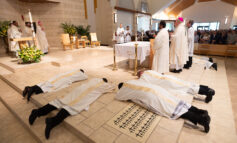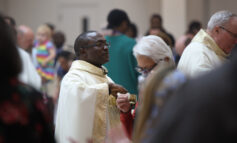By Father Thomas Esposito
Special to The Texas Catholic
January 27 marked the 75th anniversary of the liberation of Auschwitz, the most notorious of the Nazi extermination camps. Noting that occasion, Paraclete Press published the translation of a Jewish-Catholic woman’s experience in the death camps. Entitled “The Auschwitz Journal: A Catholic Story from the Camps,” the book contains the memoirs of a Hungarian woman named Klára Kardos, who survived to describe her harrowing experience of the last months of World War II.
The translator of her journal is my Cistercian confrere Father Julius Leloczky, and I am grateful to him for introducing Klára’s story to the English-speaking world.
Klára Kardos was born into a family of Jewish descent, but her mother converted to Catholicism before her birth, and she was baptized and raised Catholic. This did not shield her from the Nazi round-up of Hungarian Jews, the last group of Jews in Europe to undergo the extermination process. Her journal, written 14 years after the ordeal itself, recounts her deportation in June 1944, the agonizing freight car ride to Auschwitz, and her experience of the camp in all its dehumanizing cruelty.
While glimpses of the murder factory mechanisms are present in her text, Klára’s memoirs are full of unexpected perspectives, both heart breaking and inspiring, on the months she passed in Auschwitz.
Of the tattoo she received on her lower left arm, she simply writes “A/1248 – this is what I would be from then on.” She recalls the anguished monotony of roll-call in which the prisoners would have to stand silent and still for hours, often under the brutal sun. She spares no detail in describing the “grayish-green” soup and lack of drinking water, the misery of jostling for an extra inch of space while sleeping, the degrading biweekly disinfections, and encounters with the diabolical Dr. Josef Mengele when she was hospitalized with scarlet fever.
In the midst of recounting such horrors, however, Klára also explains how she preserved her faith and her faith, in turn, preserved her.
As a seventh-grader, she had memorized the Latin text of the ordinary parts of the Mass, and on Sundays she gathered her fellow Catholic prisoners around her to celebrate the Lord’s day by reciting the Mass and other poems she had memorized. During a bleak night in which rain poured into the leaky dorm building, she and two friends stood and held a blanket above their heads as they recited the Rosary to the rhythm of the raindrop beats: “From time to time a voice sounds from the outer darkness: ‘Are you praying? … May I also join in?’ And the prayer, strengthened by one more voice, continues: ‘…blessed is the fruit of thy womb, Jesus…’”
The sense of her role in this awful drama evokes comparisons with St. Edith Stein, a Carmelite nun of Jewish descent who perished in Auschwitz earlier in the war. Klára writes, “I don’t have to mention that the people for whose sins I longed to atone were the Hungarian people, which does not mean that it would have been foreign to me to atone for my poor fellow companions in distress, for my race.”
Klára was transferred to a German ammunition factory in Salzwedel early in 1945, and narrates her euphoria at being liberated by American soldiers on April 14, 1945. Her first instinct upon receiving her freedom was to find a Catholic church and make her confession; she attended Mass and received Communion for the first time in months the following day. She notes, with a tone of mercy rather than malice, that she prayed the Office for the Dead when she heard of Hitler’s suicide and Mussolini’s execution.
In his introduction to this remarkable book, Fr. Julius observes that St. Paul’s statement in Romans 5:20, “Where sin increased, grace abounded all the more,” “was fully realized in Klára’s life.”
Aside from the historical value of her journal as another witness to the pernicious evil of the Nazi regime, Klára’s book also serves to bolster the faith of those rightly bothered by the sense that God was entirely deaf to the cries of those consumed in the Holocaust.
The concluding lines of her journal underline the sanctity of this woman who rejoiced in the paradox of “the bliss, the happiness of suffering,” even as they offer a stark spiritual challenge to her readers. She ponders: “Is it enough, what [I] managed to put on paper – even so that the Heavenly Word may resound in just one soul? But if it was not even enough for that, I don’t mind. Let it then be the ascending melody of gratitude and homage to the One from whom all this came. He will surely understand it. And, out of the fertilizer of suffering, He will let germinate an even greater abundance of flowers in the heart and in the world.”
Father Thomas Esposito, O.Cist., is a theologian and monk at the Cistercian Abbey of Our Lady of Dallas.



